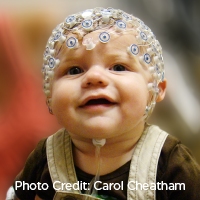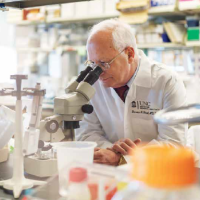Microbiome and Nutrition
The complex community of bacteria, yeasts and viruses living in our intestines, collectively known as the gut microbiome, is shaped, in part, by what we eat. Genetics, environment, and other factors also influence an individual’s microbial community. Research at the NRI investigates these complex relationships and their impact on disease risk. We use animal models and bioinformatics to study the associations between nutritional metabolites, gut microbiome, and health. What happens in the gut doesn’t stay in the gut. Your microbiome can play a role in cardiovascular disease, obesity and diabetes, and even cancer. Our team envisions a future where analysis of your microbiome can determine disease risk, and medical foods can be prescribed to treat and prevent disease by regulating the microbiome.
Publications
Microbiome and Nutrition Publications
2020
Population studies of TMAO and its precursors may help elucidate mechanisms. Meyer K
2019
Association of dietary patterns with the gut microbiota in older, community-dwelling men. Meyer K
2018
Meta-analysis of human genome-microbiome association studies: the MiBioGen consortium initiative. Meyer K
Human microbiota, blood group antigens, and disease. Sumner S
2017
Trimethylamine N-Oxide, the Microbiome, and Heart and Kidney Disease. Zeisel S
2016
Diet and Gut Microbial Function in Metabolic and Cardiovascular Disease Risk. Meyer K
Antibiotic-mediated gut microbiome perturbation accelerates development of type 1 diabetes in mice. Sumner S
Related News
Choline in Human Milk Plays a Crucial Role in Infant Memory
October 3, 2018 – Choline is present in human milk, and is especially important for fetal and infant development [2,3]. “The hint that choline is important for infant development comes from the fact that in human milk, the supply of choline remains constant across the first year of life,” says Professor Carol Cheatham from the University of North Carolina at Chapel Hill. Other important nutrients, such as docosahexaenoic acid (DHA), are present in large quantities initially, but often level off after a few months.
Culinary twist: Healthy food that helps the community
September 28, 2018 – Good Bowls taps into the UNC innovation network and brings locally sourced meals to lower-income consumers. Social innovation is nothing new at the University of North Carolina at Chapel-Hill. And using its long history of social innovation as a cornerstone, one UNC venture is blazing a trail to improve community health. If you haven’t already heard of Good Bowls, you will.
Celebrating a Decade of Nutrition Discoveries
September 28, 2018 – This October, the NRI proudly marks its tenth anniversary of delving into the science of Precision Nutrition. What began in 2008 with two faculty members and a supporting staff of nine is, today, a bustling center of scientific inquiry and discovery with a staff of 82, which includes 16 principal investigators.
Leptin’s Role in Cancer Susceptibility
August 30, 2018 – While the link between obesity and breast cancer risk is well known, the underlying mechanisms are not fully understood. Obesity alters many conditions in cells and within the body, and it is not easy to determine which of these conditions are important to the obesity-cancer link. Consequently, it is very difficult to identify potential therapeutic targets.
Cheatham Lab Memory Game Pilot Study
August 30, 2018 – The Cheatham Nutrition & Cognition Lab at the NRI is undertaking a new pilot study with 12- and 24-month-old children called the Memory Game Pilot Study. In this study the lab seeks to validate the props used in the elicited imitation paradigm, a nonverbal means of assessing recall memory in preverbal children. The props, which have been designed and produced in the Cheatham lab, will be implemented with a group of young children of the same ages in an already-planned, collaborative study with Emory University.
A Chance I Might Discover Something
This article was published originally in July/August 2018 Carolina Alumni Review. July 31, 2018 – From his lab in a textile mill-turned-food research center, a UNC scientist has brought an important nutrient to the world’s attention. Dr. Steven Zeisel wants to make...






